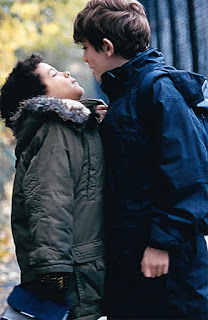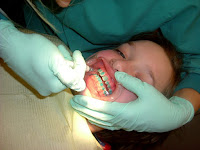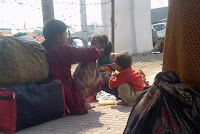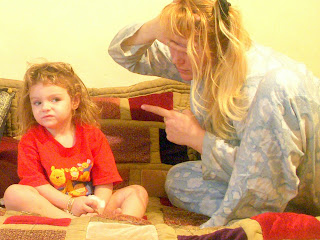Would you let a child TRY school . . . if they want to?
No.
In my opinion school is not benign.
The school system is actively damaging, particularly to children's self-esteem and natural confidence in the intrinsic rewards of learning.
If a supervisor could accompany the kids to school the whole time they were 'trying,' it might be possible for a child to have an experience that was neutral, or even educational.
But alone in that self-referential, detrimental system... no.
When they're very young, absolutely no. When they're young teens, at a time when they're going through major brain development and having a hard time even driving their usual lives with balance and ease, also definitely no.
What if the child could handle it?
But alone in that self-referential, detrimental system... no.
When they're very young, absolutely no. When they're young teens, at a time when they're going through major brain development and having a hard time even driving their usual lives with balance and ease, also definitely no.
What if the child could handle it?
While it might be possible, sometimes, for a stable, confident child to deftly handle some of what happens within that system --a direct conflict, say.
But how many a day? Two before the bell, 2 before lunchtime, 3 more during lunch and 3 in the afternoon? Let's pretend there won't be more after the bell in the hallways or on the grounds...just because it's an easy day.
Because then there is All Of The Rest. Most of which is never handled, never addressed at all as it is, within the system, seen as normal. All kids when they first go into the system (at any age, even if that's before they're able to speak) have to figure out what to do about all of that:
Do they stand up to the teacher about the bullying? Every single instance of it, or is there some scale of 'that's not bad enough to comment on'? What about the sexual assault? What about the child who is utterly ignored? What about the one getting a disproportion of the school's or teacher's attention, whether because of higher needs or just worse behaviour? What do they do about the kids who are left to flail, or sit dully until their aid comes back tomorrow? Nothing? Anything?
Somehow, I managed to import a sense that 'Linda's doing something else that's important' into teacher's heads --or I was far more trouble to deal with than I was worth-- or both, so I was respected (or at least not stomped on) when I felt the need to move around, or believed I knew enough about this subject already, or whatever provoked me to routinely leave the classroom to do important Linda things, like having a smoke. I was marked present for classes I spent at the orthodontist.
But how many a day? Two before the bell, 2 before lunchtime, 3 more during lunch and 3 in the afternoon? Let's pretend there won't be more after the bell in the hallways or on the grounds...just because it's an easy day.
Because then there is All Of The Rest. Most of which is never handled, never addressed at all as it is, within the system, seen as normal. All kids when they first go into the system (at any age, even if that's before they're able to speak) have to figure out what to do about all of that:
Do they stand up to the teacher about the bullying? Every single instance of it, or is there some scale of 'that's not bad enough to comment on'? What about the sexual assault? What about the child who is utterly ignored? What about the one getting a disproportion of the school's or teacher's attention, whether because of higher needs or just worse behaviour? What do they do about the kids who are left to flail, or sit dully until their aid comes back tomorrow? Nothing? Anything?
What about the lack of respect for the humanity, body wisdom and personal pace of everyone except the strongest willed and most confident?It was not lost on me while I was in the system that I, alone, was allowed to wander the halls during class time, get up and leave a lecture while the teacher was speaking (without a murmur of reproach) or completely fail to hand in any portion of an assignment without it negatively affecting my grade.
Somehow, I managed to import a sense that 'Linda's doing something else that's important' into teacher's heads --or I was far more trouble to deal with than I was worth-- or both, so I was respected (or at least not stomped on) when I felt the need to move around, or believed I knew enough about this subject already, or whatever provoked me to routinely leave the classroom to do important Linda things, like having a smoke. I was marked present for classes I spent at the orthodontist.
11 Real Things Really Wrong with Public School
- The teacher being repeatedly distracted from teaching by kids' needs, and by conflicts among the children, a simple function of being vastly outnumbered
- The quiet, seat-to-seat nastiness that the teacher sees but doesn't address (because: outnumbered)
- All of what the teacher doesn't see (still outnumbered)
- What we all know happens to kids who point out (tattling / ratting) what the teacher didn't see (because snitches are also outnumbered)
- The teachers who are bullies, from tactics used to control the classroom (outnumbered) to what happens to kids the teacher doesn't like or whose parents demand better care of their children
- The casual violence in the halls and grounds
- The tremendous energy used resisting the system: being late, devaluing intelligence and high marks, forgetting (homework, instructions, what the teacher just said,) talking back and refusal to comply
- The basic lack of civility and respect toward (and, consequently, among) the children
- The errors in textbooks and answer keys, and outdated information kids can easily check on their phones (and what happens to children who correct teachers in public)
- Teachers who hate kids, their jobs, or the subjects they teach
- The clowning, distractions and utter disrespect for the teachers and material taught
 |
| Read Michael 1952's story at https://bit.ly/2zuUZYP |
Why not let a child try school, if the child wants to?
Because school is not a benign environment, and few adults who lived through it understand the ramifications of even a short indoctrination into that system, for kids who have never had to live it.





























